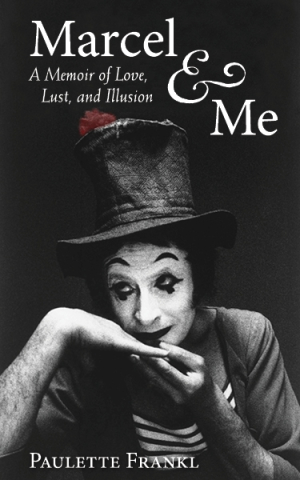Marcel & Me
A Memoir of Love, Lust, and Illusion
Frankl’s relation of intimate details is a vehicle for exploring just how ill-equipped the master of illusion was to handle intimacy.
The most recent offering from accomplished artist Paulette Frankl, Marcel & Me, is equal parts memoir and tribute, detailing the author’s decades-long, sexually charged liaison with legendary mime Marcel Marceau. This is a loving and passionate but brutally incisive peek behind the masks of a beloved personality.
In her early thirties and fresh from a divorce in 1971, Frankl happened into one of Marceau’s shows and became instantly enamored of his artistry. Propelled by a sense of fate, she sent him a heady, dreamlike letter, to which he responded with an invitation for a date.
The sense of insight Frankl garners from that first performance remains throughout, even as Marceau finds new and creative ways to keep his lover at arm’s length. Frankl becomes adept at dissecting his most famous acts: “Marcel ‘managed’ death by becoming its puppeteer,” she says, and such insights carry authority. So, too, do they melt into meditations on outward aspects of his personality, which, seen through Frankl’s eyes, come to seem themselves like a sustained performance.
Marceau turns out to be less a leading man than a master of illusions, shocking Frankl with his foibles and blunders. Beneath his glittering surface, she finds a man laden with outward flaws: bad breath, androgyny, and an utter disregard for foreplay. Frankl’s descriptions are excruciating in their detail.
As sex comes to dominate their exchanges, a connection drawn to Anaïs Nin seems apt. Chapters are given to vivid recollections of Frankl and Marceau’s fevered coupling, with some fantasies interspersed. These are colorful and unbounded, fulfilling an early description of the book as a “sexually active” one.
Frankl’s diction is piquing and racy, if it sometimes trends toward irruptive descriptions—“god rod” is a particularly unwieldy euphemism. Those who hold the mime in reverence may be scandalized by surrounding revelations.
Still, Frankl’s decision to relate the most intimate details of her friendship with Marceau becomes a useful vehicle for exploring just how ill-equipped her master of illusion was to handle true intimacy. Bodily, he offers her everything, but in the harsh light of day, there are other lovers to contend with. Invitations come at random moments. Interludes are subject to the mime’s tempestuous demands. Frankl is always held at a distance. The honor she expresses at being invited in is balanced by his refusal to let her far beyond his thresholds.
Frankl’s book memorializes Marceau with a blend of earned adoration and blunt castigations. She does not flinch from praising his genius; neither does she hesitate to explore his insecurities and other personal failings. Because the book centers on a relationship that always skirted satisfying intimacy, the final pages lack a real resolution, and Frankl is often left to guess her way toward the artist’s soul. A whole chapter is devoted to her fantasy of what their interactions might be like, but this only highlights the gulf between them. Her attempts to paint a rounded picture are an engrossing endeavor.
Those who come to Frankl’s work to find Marceau may not always like what they see, but will still be struck by a sense of veracity. Both brutal and heartfelt, Marcel & Me garners insights into the life of a mysterious and tragic international celebrity.
Reviewed by
Michelle Anne Schingler
Disclosure: This article is not an endorsement, but a review. The publisher of this book provided free copies of the book and paid a small fee to have their book reviewed by a professional reviewer. Foreword Reviews and Clarion Reviews make no guarantee that the publisher will receive a positive review. Foreword Magazine, Inc. is disclosing this in accordance with the Federal Trade Commission’s 16 CFR, Part 255.

